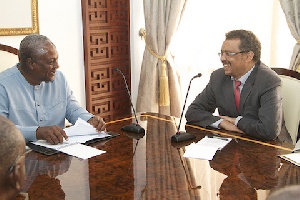President John Dramani Mahama on Tuesday announced that Ghana will contribute 850 troops to the war-torn South Sudan to help restore peace and stability to the North African country.
He said the deployment of the Ghana battalion to the restive country followed a request from the United Nations Secretary-General to Ghana to help in keeping the peace and assist with the humanitarian efforts.
President Mahama announced this when Dr Tedros A. Ghebreyesus, Ethiopian Foreign Minister called on him at the Flagstaff House, Kanda.
President Mahama indicated that the National Security Council met on Monday to ratify the troop deployment.
The Ethiopian envoy, who discussed issues of common interest and the situation in South Sudan with President Mahama, was accompanied by Ms Hannah Tetteh, Minister of Foreign Affairs and Regional Integration, Mr Francis Yankey, Ghana’s Ambassador to Ethiopia and a 10-member Ethiopian delegation.
President Mahama noted that as a young independent country that is facing development challenges, South Sudan needs stability to develop and not conflict.
“When I received the request from the UN Secretary-General, I did not hesitate to give my provisional approval,” he added.
The President explained that a decision had been taken to mobilise the 330 Ghana Battalion currently on peacekeeping duties in La Cote d’Ivoire to South Sudan, but upon a request from the UN for a fully-fledged battalion, 520 fresh troops and equipment were being mobilised to complement the 330 troops.
“We see on TV every day the human suffering and the displaced people,” President Mahama said and gave the assurance that “Ghana will deploy as quickly as possible to secure the lines for humanitarian assistance to come through.
“As Ethiopia continues to teleguide the peace process, we hope that normalcy will return to that country,” he said, and lauded Ethiopia for the initiative to help restore peace to South Sudan.
President Mahama reiterated the need for Africa to embark on infrastructural projects that would facilitate the integration agenda, stressing the need for the creation of free trade areas to boost intra-African trade.
He said Ghana has a pool of skilled human resource in the area of hydro power management, which Ethiopia could tap to embark on its ambitious hydro electric project.
Ghana, he said, is looking forward to the establishment of a commodity exchange to preserve and enhance the country’s food stock and boost the production of farmers.
He said Ghana is keen to tap Ethiopian expertise to facilitate the project.
Dr Ghebreyesus lauded Ghana for its global peace keeping missions, and indicated that when the Sudan conflict started, Ethiopia proposed a cessation of hostilities, the commencement of political dialogue and the provision of access to facilitate humanitarian efforts.
“The two parties are still meeting in Addis Ababa and they have agreed on cessation of hostilities and the release of detainees,” he said, pointing out that “The negotiations are a bit tough but we are trying our best to resolve the crisis amicably through political dialogue.”
He called for the strengthening of relations between Ghana and Ethiopia, started by Dr Kwame Nkrumah and Emperor Haile Selassie.
The envoy noted Ghana and his country clenched general agreements on various spheres of co-operation and advocated the need for follow-up mechanisms and sector-specific agreements on trade and investment and avoidance of double taxation.
General News of Wednesday, 15 January 2014
Source: GNA

















